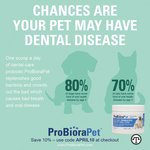

by Dr. Jay King
(NAPSI)—In a recent poll of North American pet owners, 58 percent of respondents said their pets have terrible breath—some even compared it to smelly garbage and sweaty gym clothes. More alarming is that by the age of three, 80 percent of dogs and 70 percent of cats show signs of oral disease.
The Problem
The reality is that bad breath is produced by harmful bacteria which forms plaque and can be an indicator of gum disease. Just as in people, gum disease in pets is painful and can lead to expensive dental treatment and tooth loss. Plus, the bad bacteria can make its way into the bloodstream and cause chronic disease, joint damage and worse.
An Answer
The good news? There’s a simple affordable way to improve pets’ oral health at home. In a poll of ProBioraPet customers, 88 percent reported that their pets’ breath improved after taking the product. Simply put, this unique dental-care probiotic contains ProBiora3®, a patented blend of three positive bacteria strains which solely support tooth and gum health. The beneficial bacteria colonize on tooth surfaces and along gumlines and crowd out the bad bacteria. There’s no taste and no odor, so pets still enjoy their food.
Customer survey respondents also reported their pet’s breath is “now sweet enough for them to give me kisses” and “their breath is clean even in the car with the windows rolled up.”
Adding this all-natural dental-care probiotic powder to pets’ daily food can be an important step in improving their oral health. The result is a healthier mouth for your pets and sweeter kisses for you. After all, a healthy body starts with a healthy mouth. And a healthier pet is a happier pet.
Learn More
For further information visit www.ProBioraPet.com. While there, take advantage of a buy one get one free offer with code NAPSBOGO.
• Dr. King is medical director for Center for Animal Rescue and Enrichment of St. Louis, MO. He also holds educational certificates in Biology, Endangered Species Management, Conservation/Captive Breeding Endangered Species, and Animal Behavior, and has won various awards, scholarships and grants.